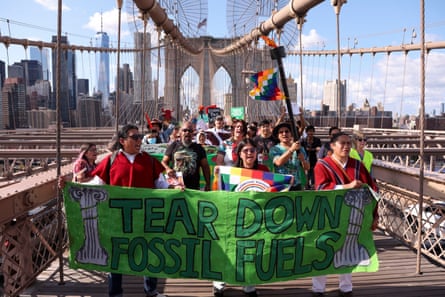
Countries are ignoring commitments they made less than a year ago to shift away from fossil fuels and to provide aid to those most vulnerable to the climate crisis, a host of leading figures have admitted during a gloomy start to a major climate summit in New York.
Al Gore, the former US vice-president, and John Kerry, the former US secretary of state and climate envoy, have led the condemnation of the largest greenhouse gas emitters, led by China and the US, for failing to follow a UN pact signed in Dubai by nearly 200 countries in December to “transition away” from oil, coal and gas.
“We made an agreement in Dubai to transition away from fossil fuels,” said Kerry, who was the US lead climate negotiator at the time. “The problem? We aren’t doing that. We’re not implementing. The implications for everybody, and life on this planet, is gigantic.”
Kerry, who in his previous position defended the US’s role as it became the world’s leading oil and gas producer under Joe Biden, admitted that the US needed to do more and said a pause placed on booming liquified natural gas export permits by the US president should remain.
“The demand is what is crushing us right now,” Kerry said of the surge in gas exports. “I have to tell you all around the world people are falling short or not even trying. In Dubai almost 200 countries agreed to transition away from fossil fuels in a way that’s fair, equitable and orderly … and they [fossil fuel companies] are just plowing ahead, like it’s business as usual.”
Asked to give oil and gas companies a grade in their efforts to transition to cleaner energy, Kerry said: “Is there a letter underneath Z?”
Kerry was speaking at an Axios event held as part of Climate Week NYC, a summit that has drawn about 100,000 government leaders, businesspeople, scientists and activists to New York alongside the UN general assembly.

The week is taking place amid a daunting backdrop of stubbornly high global emissions, record-breaking temperatures and the real possibility of Donald Trump, who has called climate change a “hoax” and has called for the demolition of Biden’s climate policies, again becoming US president in November’s election.
Wealthy countries have been handing out new oil and gas exploration leases at record levels despite the agreement at the Cop28 talks in Dubai, with decades of further planet-heating emissions set to be locked in during 2024, itself almost certain to be the hottest ever recorded. “In signing such a surge of new oil and gas licenses, they are signing away our future,” António Guterres, secretary general of the UN, said of the highest emitters in July.
“Many people felt it was a great victory to have that language about transitioning away from fossil fuels, I felt that too,” said Gore. “But now look at the agenda for this year’s Cop and they’ve completely ignored that.
“The climate crisis is a fossil fuel crisis, the fossil fuel industry is the wealthiest and most powerful industry in the history of the world. They fight ferociously to stop anything that would stop consumption of fossil fuels. They are way better at capturing politicians than emissions.”
Gore said there were some optimistic signs ahead of the upcoming Cop29, to be held in Azerbaijan in November, such as the “incredible” levels of investment flowing into renewable energy like solar and wind, primarily in China, but that the pace of the transition must accelerate drastically if the world was to avoid disastrous climate impacts.
A weariness with seemingly endless, fruitless meetings about the climate crisis – there have been annual UN talks on this for nearly 30 years – and a litany of unfulfilled promises is particularly grating for the small island states most vulnerable to the impacts of floods, droughts and heatwaves, despite themselves only emitting minuscule amounts of greenhouse gases.
“I’m tired of talks, I want to see some action,” Philip Davis, prime minister of the Bahamas, told the Guardian. “We have been talking about climate change for 29 years now where are we today? For the first time in one whole year we have been over 1.5C – that should shake us. I’m not listening now, I want to see some action, real action.”
Davis said that new fossil fuel projects in countries such as the US and UK have flouted the international agreement to move away from polluting energy. “What does that signal, that we are moving away from it?” he said. “So where does the disappointment lie? It should lie with countries like ours, whose emissions are negligible.”
Davis said richer countries also “haven’t lived up to” promises on climate finance, via either a decade-long pledge to provide billions to developing countries or a more recent agreement, struck in Dubai last year, for a “loss and damage” fund that has so far raised just $800m. “Countries need to recognize $800m isn’t enough, trillions are needed and we need to find a way to get there,” he said.
It is five years since Hurricane Dorian became the worst storm to ever hit the Bahamas, killing dozens of people and causing $3.4bn in damages, more than the entire annual revenue generated by the archipelago of nearly 700 islands. Scientists have warned that Atlantic hurricanes are becoming fiercer due to a warming ocean and atmosphere.
“When people hear the rain now, sometimes they are traumatized by it,” said Davis. “We are still rebuilding and still recovering from the damage and loss from that hurricane. We are in a perpetual cycle of rebuild and recovery. Every year we pray we don’t get another hurricane so we have to borrow again, making our debt spiral. It takes away from our ability to develop our country, to deliver social services for our people.”
 Print
Print


